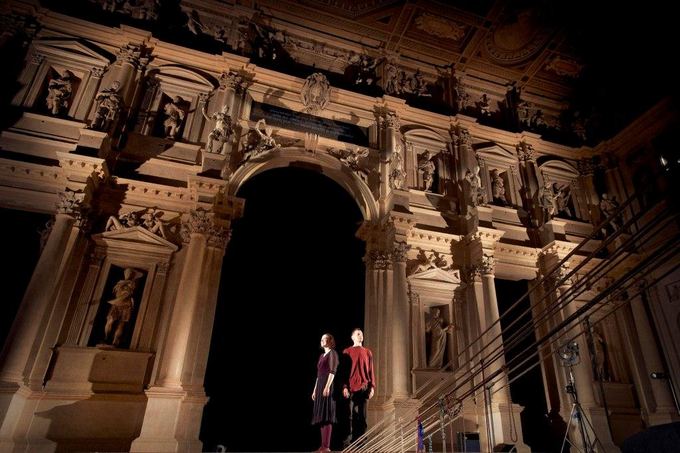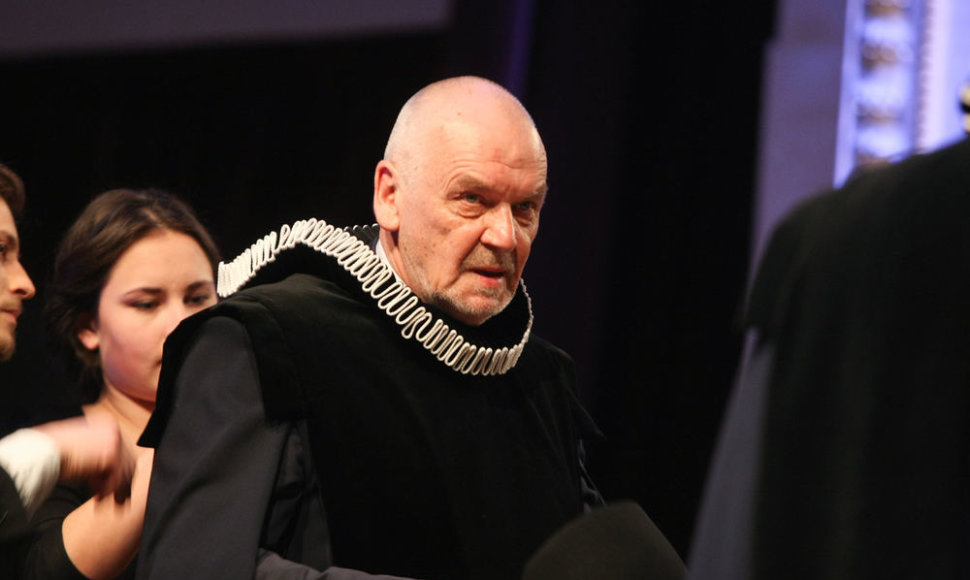One year ago, the authorities of Vicenza, a wealthy town of jewellers, and the theatre management announced the news: the Teatro Olimpico will be run by a Lithuanian.
It caused a sensation among Italian theatre people. “Are you not afraid this will turn you, a free artist, into manager?” I asked Nekrošius frankly back then. His new post, direttore artistico, sounded grave enough. Nekrošius then admitted he had never had an official title before. That's why, perhaps, he took his time before deciding to accept the offer or not. He did, eventually, with an idea that, being a free man that he is, he would always remain one.
And there had been doubts before the start of Nekrošius' first “Lithuanian” season. Now, he has already lined up the second one and no reservations remain – it was a brilliant season in one of the prettiest theatres in Italy.
The Teatro Olympico is Europe's oldest roofed theatre and a UNESCO World Heritage Site. Designed by famous Italian architect Andrea Palladio and inaugurated in 1585, the theatre was once described by Salvador Dali as “theatre of divine aestheticism.”
 |
| „Olimpico“ teatro archyvo nuotr./Nekrošius' "Paradise" at the Teatro Olimpico |
Vicenza at Lithuanian's feet
I've exchanged only a few words with Nekrošius about his season in the Teatro Olimpico. Like in a telegram, with pauses: “Everything was very good. I expect to continue with this work. I've gotten used to the theatre...” So we agreed that I would have people of Vicenza talk about the last theatre season rather than the director himself.
– How would you rate Nekrošius' season at the Teatro Olimpico? - I asked Giacomo Cirella, the head of Vicenza municipal theatre foundation.
– The great Lithuanian maestro successfully completed the 65th cycle of classic plays at the Teatro Olimpico. He managed to stir theatre scene in Veneto and entire Italy. It was decided to invite Nekrošius as art director following many mediocre seasons, when the “Classic” cycle was beginning to thin, had fewer and fewer performances. And now, it is once again an important national theatre event.
– Was it so because of famous names he invited and well-known plays?
– Yes, of course, the plays were truly great, but we care about something else too – about reverence to the Teatro Olimpico, about putting it to innovative use.
For the first time, probably, Nekrošius and the directors he invited managed to give meaning to the space of our theatre. In short, the Teatro Olimpico was not just this wonderful place where people came to watch plays. The theatre itself, along with performers and directors, became an actor in interpreting classic repertoire. In terms of art, the last season was excellent. It was an important push for Vicenza.
– Nekrošius is an established theatre director. But did he manage to win Vicenza over?
– Interest from the public was massive, I'd say total. Figures confirm this – we've sold out to all 15 performances of the season. On the other hand, we've noticed it was a different kind of public compared to our previous seasons. More young people came to the theatre. 40 percent of our spectators were under 35. It is a huge achievement for a theatre of classical repertoire. We are more used to theatregoers between 45 and 50.
Nekrošius' own staging of “Paradise” was met with huge interest. Many had already seen the first two instalments, “Hell” and “Purgatory”, so viewers were eager to see the conclusion of this immense piece, Dante's “The Divine Comedy”. The public loved the opening performance of the season, so they retained interest for other plays, too.
– After all, Nekrošius is not an Italian. Has the town warmed up to him?
– Vicenza might not be a big town, but it has always been known as an important international centre of culture. I could mention the traditions of our jewellers or the great architect Palladio and his creation – the Teatro Olimpico. People of our town instantly fell in love with the great director who took on heavy responsibility of reviving the theatre festival so important to the town but which had already been written off by many. In short, everyone here admires the artist who speaks little, but works much and delivers wonderful results.
Taking on the Old Testament
Nekrošius will be starting his second season at the Teatro Olimpico on 19 September. His theatre company, Meno Fortas, will present a premier of “The Book of Job”.
Nekrošius speaks willingly about his new production: “It will probably be one of the most complex of my works. An intelligent, interpretative process. I could have chosen a classical text, everything would have been easier, I could have lived in peace. But something made me pick this piece.”
“The Book of Job” is a scripture in the Old Testament. The story tells about Job who loses everything – his wealth, children, health – but refuses to give up his faith in God. “No one is insured against misfortunes of life. So far, I only know that the stage will be permeated with an atmosphere of pain,” the director gives a glimpse to his next production.
The new season
The next season at the Teatro Olimpico will include a production of Aristophane's “Birds” by famous Italian actor and director Pippo Delbuono and American musician Laurie Anderson.
The Teatro Olimpico will also present two plays by Bertolt Brecht, “Life of Galileo” (directed by Nekrošius himself) and “The Life of Edward II of England” (directed by Italian Andrea Baracco). Well-known Italian director Barberio Corsetti was invited to stage the Indian epic “Mahabharata”.
The season will close with a play-conference about two energies according to the Greek philosophy, “Eros and Thanata”.


















